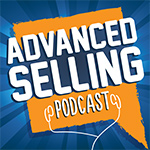Episode #371: Master Your Messaging
 Storytelling isn’t a new idea. But have you truly mastered your messaging? In today’s episode, veteran sales trainers Bill Caskey and Bryan Neale help you learn to blend your company’s story with your own to create your personal messaging.
Storytelling isn’t a new idea. But have you truly mastered your messaging? In today’s episode, veteran sales trainers Bill Caskey and Bryan Neale help you learn to blend your company’s story with your own to create your personal messaging.
How do you know what things to say and not say when sharing your story?
What elements of your story will help your customer better understand what you do?
In this episode of The Advanced Selling Podcast, Bill and Bryan walk you through how to improve your messaging around the edges by using their storytelling formula. Your story and your messaging can work for you or against you— listen in today to learn how mastering your messaging will allow you to stand out and differentiate yourself against your competition.
Also mentioned in this podcast:
- Click here to watch Simon Sinek’s Ted Talk
- Learn more about Hiscox’s small business insurance
- Check out our ALL IN Audio Program
[smart_track_player url=”http://traffic.libsyn.com/billcaskey01/16-03-24-371-MasterMessaging.mp3″ title=”Episode #371: Master Your Messaging” artist=”The Advanced Selling Podcast” social=”true” social_twitter=”true” social_facebook=”true” social_linkedin=”true” social_email=”true”]
